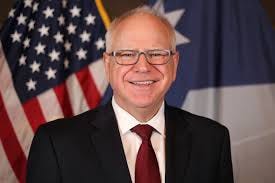If you are reading this, I am sure you know the potential repercussions of Project 2025. Just a quick summary - Project 2025, a conservative plan for the next Republican administration, poses significant risks to U.S. climate policy. It advocates dismantling key agencies like the EPA and NOAA, rolling back regulations that limit emissions, and reducing federal investment in clean energy. This could increase pollution, hinder climate science, and disproportionately affect vulnerable communities. By transferring regulatory powers to states, the plan may lead to inconsistent enforcement of environmental laws, further exacerbating climate challenges (Yale Climate Connections) (SEJ) (Center for American Progress).
The other week, the Harris campaign narrowed down their top picks for the VP slot, which included Shapiro, Kelly, Walz and Buttigieg. In this post, I highlight the key climate accomplishments of each candidate.
Josh Shapiro
Background: Governor of Pennsylvania, former Attorney General of Pennsylvania Climate Action Credentials:
Legal Actions: Aggressively pursued legal action against polluters and supported environmental justice initiatives (Yale Climate Connections).
Policy Advocacy: Advocated for renewable energy policies and reduced reliance on fossil fuels, balancing Pennsylvania’s significant energy production sector (Yale Climate Connections).
Environmental Justice: Focused on ensuring climate policies benefit disadvantaged communities, emphasizing the equitable distribution of environmental benefits and burdens (SEJ).
Mark Kelly
Background: U.S. Senator from Arizona, former astronaut Climate Action Credentials:
Legislation: Supported key climate legislation in the Senate, advocating for investments in solar and wind energy, critical for Arizona’s climate (SEJ).
Public Statements: Consistently highlighted the national security implications of climate change, leveraging his background in the military and space exploration to push for robust climate policies (SEJ).
Renewable Energy: Strong proponent of transitioning to renewable energy sources and improving energy efficiency (Center for American Progress).
Tim Walz
Background: Governor of Minnesota Climate Action Credentials:
Climate Action Framework: Implemented a comprehensive framework aiming for net-zero emissions by 2050, integrating renewable energy, agriculture, and forestry initiatives (Center for American Progress).
100% Clean Energy by 2050: Advocated for transitioning Minnesota to 100% clean energy, setting ambitious state-level targets (Center for American Progress).
Environmental Justice: Ensured climate policies benefit vulnerable and marginalized communities, with a focus on equitable implementation (Center for American Progress).
Clean Cars Minnesota: Launched initiatives to align vehicle emissions standards with California’s stringent regulations, targeting the transportation sector’s emissions (Center for American Progress).
Pete Buttigieg
Background: U.S. Secretary of Transportation, former Mayor of South Bend, Indiana Climate Action Credentials:
Infrastructure and Transportation: As Secretary of Transportation, focused on policies to reduce emissions from the transportation sector, promoting electric vehicles and sustainable infrastructure (Yale Climate Connections) (SEJ).
Smart Cities: Advocated for smart city technologies and sustainable urban development as mayor, integrating climate resilience into city planning (Yale Climate Connections).
Public Transportation: Pushed for significant federal investment in public transportation to reduce carbon emissions and promote sustainable transit options (SEJ) (Center for American Progress).
Instead of using my own option to select the candidate who has the strongest record on climate action, I asked artificial intelligence to make the selection. Inputting the above overviews and prompting AI to take into account any/all available information, the top candidate was:
Tim Walz
Tim Walz stands out for his comprehensive and ambitious climate action plan, which includes the Climate Action Framework aiming for net-zero emissions by 2050, advocating for 100% clean energy, and making significant strides in environmental justice. His leadership, in implementing state-level policies that integrate renewable energy, agriculture, forestry, and transportation, makes him the ideal candidate more likely to achieve the most in climate action as VP(Center for American Progress) (SEJ) (Yale Climate Connections).
From what I have read, it seems Tim Walz does not have a big ego. According to former President Barak Obama’s digital director, Teddy Goff “one of the many extremely appealing things about Walz is that he doesn’t appear to have had a grand plan to take over the universe. He appears to have gone into politics because he likes helping people, and risen because he’s really good at that. What a concept!”
When looking at the impacts of climate change, I would argue that Minnesota is being affected least by the climate emergency. In fact, Duluth has been delegated as one of only a handful of climate havens in the United States. Climate Havens are locations that are essentially protected against the worst impacts of the climate emergency. Some research has found that the small city is welcoming 2,094 climate refugees each year. While Minnesota might not be in the cross hairs of climate change, I truly believe Walz understands the importance of collective climate action. Why? Because, as Goff said, “he likes helping people.”
I am happy to be part of the Iowa Writer’s Collaborative!





👍impressive